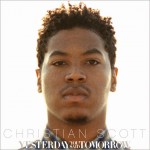 Christian Scott makes every note count. In his short but impressive career he has developed a unique instrumental identity using his “whisper technique,” a method that allows him to smear notes, giving his playing a conversational texture and tremendous dynamic range. When Scott takes off with a high intensity run after a series of soft, thickly textured phrases on “K.K.P.D.” his playing explodes like fireworks, or maybe like police car sirens. His understated phrasing is particularly effective when placed against the hypnotic, glistening framework assembled by his outstanding band, a unit that plays with a singular purpose and mood evocation reminiscent of Miles Davis’ great ’64-’68 pre-fusion quintet. The continuity of the band’s sound is particularly impressive considering only drummer Jamire Williams and guitarist Matthew Stevens remain from the last album. Williams in particular is crucial to Scott’s sound, playing furious bursts of percussion against the grain of the hypnotic, meditative pulse of the unit’s angular propulsive sense.
Christian Scott makes every note count. In his short but impressive career he has developed a unique instrumental identity using his “whisper technique,” a method that allows him to smear notes, giving his playing a conversational texture and tremendous dynamic range. When Scott takes off with a high intensity run after a series of soft, thickly textured phrases on “K.K.P.D.” his playing explodes like fireworks, or maybe like police car sirens. His understated phrasing is particularly effective when placed against the hypnotic, glistening framework assembled by his outstanding band, a unit that plays with a singular purpose and mood evocation reminiscent of Miles Davis’ great ’64-’68 pre-fusion quintet. The continuity of the band’s sound is particularly impressive considering only drummer Jamire Williams and guitarist Matthew Stevens remain from the last album. Williams in particular is crucial to Scott’s sound, playing furious bursts of percussion against the grain of the hypnotic, meditative pulse of the unit’s angular propulsive sense.
Pianist Milton Fletcher, Jr. shows outstanding range, from the pensive balladry of “Isadora” to the single note architecture of Thom Yorke’s “The Eraser.” Scott’s reading of Radiohead fits seamlessly into his own work—all he has to do is simplify the complex rhythms that populate the rest of the album—but that in itself is no surprise. Yorke’s compositions have been covered by jazz artists from Michael Wolff to Brad Mehldau. What is surprising is the sense that Radiohead could probably record an album of Scott’s compositions. There is very little distance between the trance dances of Scott’s conception and the ambient sound of much contemporary pop.
There is an unsettling, deliberate disconnect between this music—which can be by turns ethereal, extraordinarily delicate, lush, jagged-edged, otherworldly and narcotic—and the way Scott chooses to define it. These could be exotic landscapes such as Davis and Shorter conjured on E.S.P., but Scott imbues his sonic visions with titles charged with anger and despair—“Angola, LA & the 13th Amendment,” “The Last Broken Heart,” “Jenacide,” “The American’t,” “An Unending Repentance.” These compositions convey complex emotions that could be titled in any number of ways; if one of the brightest young lights in jazz conceptualization chooses to evoke the sense of pain and despair these titles imply, our contemporary zeitgeist must be deeply, deeply pessimistic.




